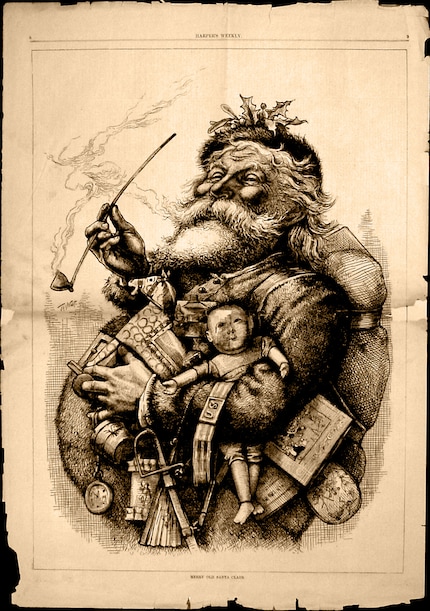

Father Christmas: from festive hero to advertising icon for Coca-Cola
Once upon a time, there was a friendly Father Christmas who brought joy to children and handed out presents. But then Coca-Cola came along and turned him into a symbol of commerce and consumerism.
The red and white uniform we know today was perfected by the brand and spread globally. Father Christmas has become a walking billboard for lemonade. A masterpiece of marketing: the very spirit of Christmas - contemplation, community and giving - has been transformed into a permanent sales event.
Before Coca-Cola, there was Santa - but different
Historically speaking, there were already depictions of a bearded, chubby man before Coca-Cola appropriated him. As early as 1863, the cartoonist Thomas Nast sketched a Father Christmas in red and white, and the New York Times also described such a Santa Claus in 1927. Coca-Cola thus built on existing elements, but helped them to become globally recognised through massive advertising.

Christmas: A celebration of... advertising?
Instead of charity, there are discounts these days, and instead of Christmas baubles, we find special promotions. Coca-Cola has also understood how to integrate a figure into a sales strategy. With clever campaigns, the somewhat overfed jolly man was anchored in people's minds.
Everyone knows the adverts with the Coca-Cola trucks at Christmas or commercials in which Father Christmas fulfils his role as an influencer and gleefully tastes the brown lemonade. The message is clear: drink Coca-Cola. Preferably lots of it.
And Coca-Cola has even managed to get other brands to pay licence fees in order to bring their own products onto the market that exploit the popularity of Coca-Cola Father Christmas.
From festival to consumption festival
If we are honest, Christmas has degenerated into a consumer festival. Not only has Coca-Cola made the old man part of its brand. It's also no longer about the festivities - it's about maximising consumption and giving presents to others. Compulsion, stress and unpleasant situations make it all less contemplative and familiar. You can read here why it makes sense to stop giving presents.
Conclusion: consumption instead of contemplation
What remains is the realisation that Coca-Cola has turned Father Christmas into a well-oiled sales machine and Christmas has degenerated into a consumer party. Perhaps we should pause for thought at Christmas and think about what is more important to us: an old, commercialised fairytale character or the actual idea behind the festivities?
Cool: Creating interfaces between the real world and the world of pure information. Not cool: Driving by car to the mall to shop. My life happens online, the information age is where I feel at home.




